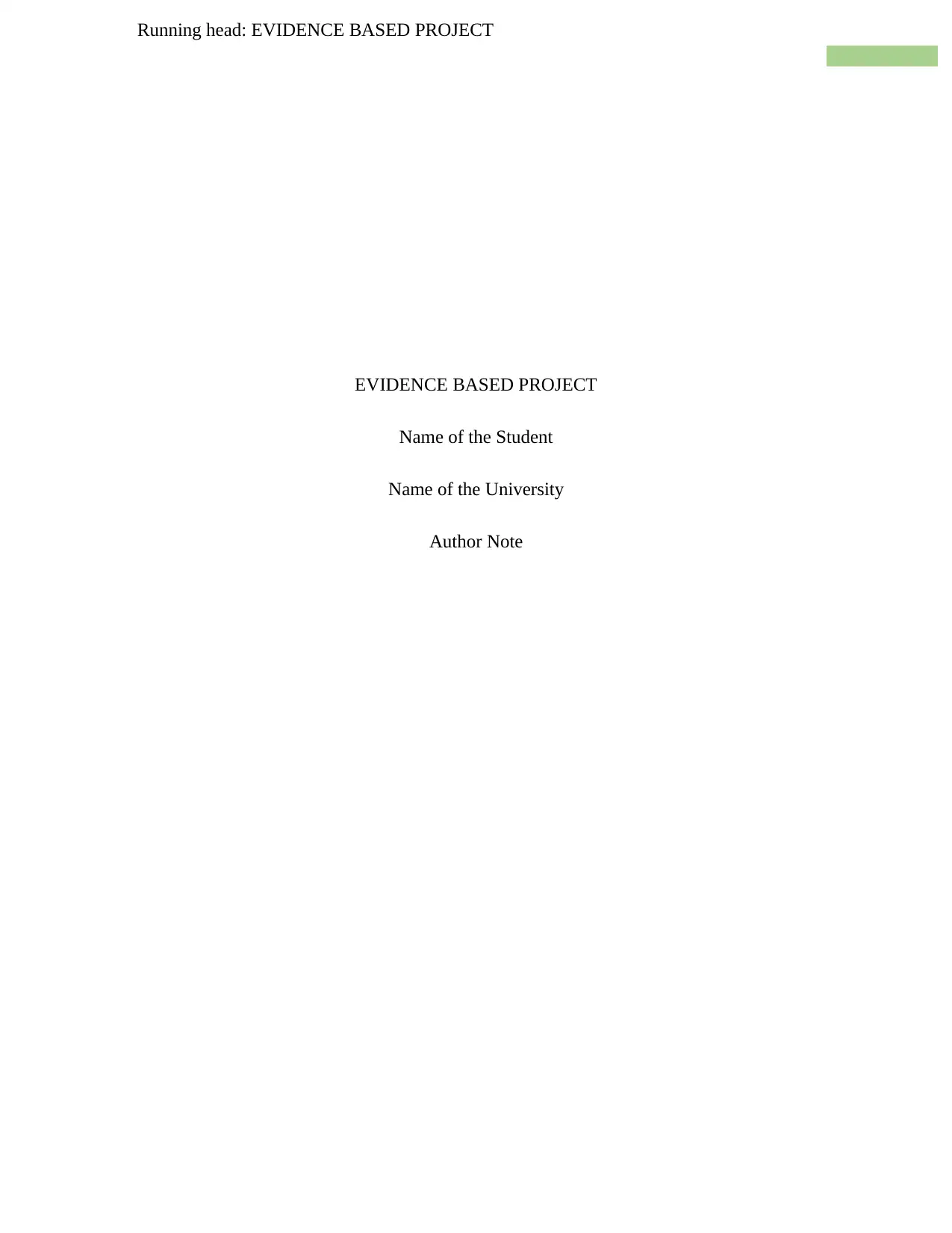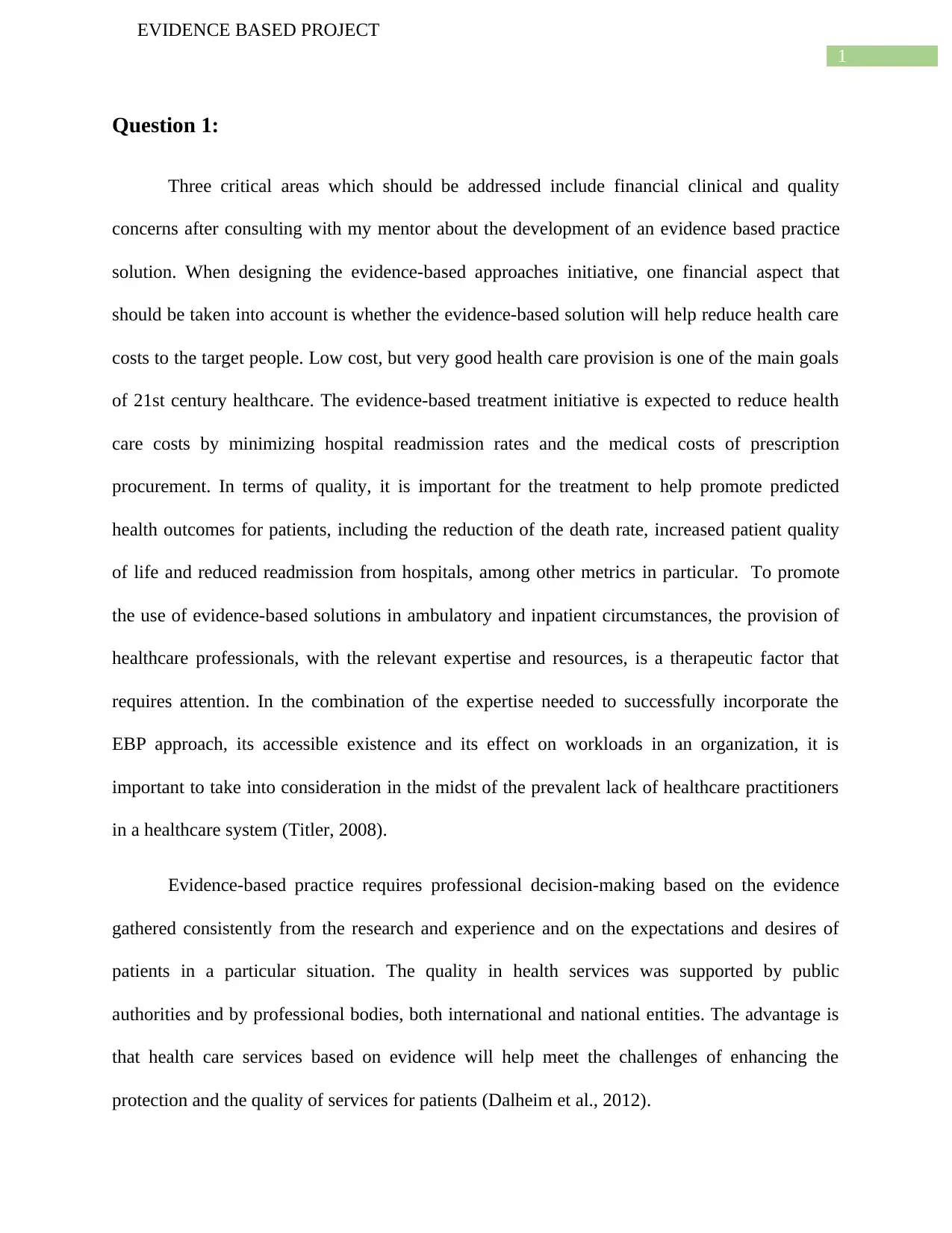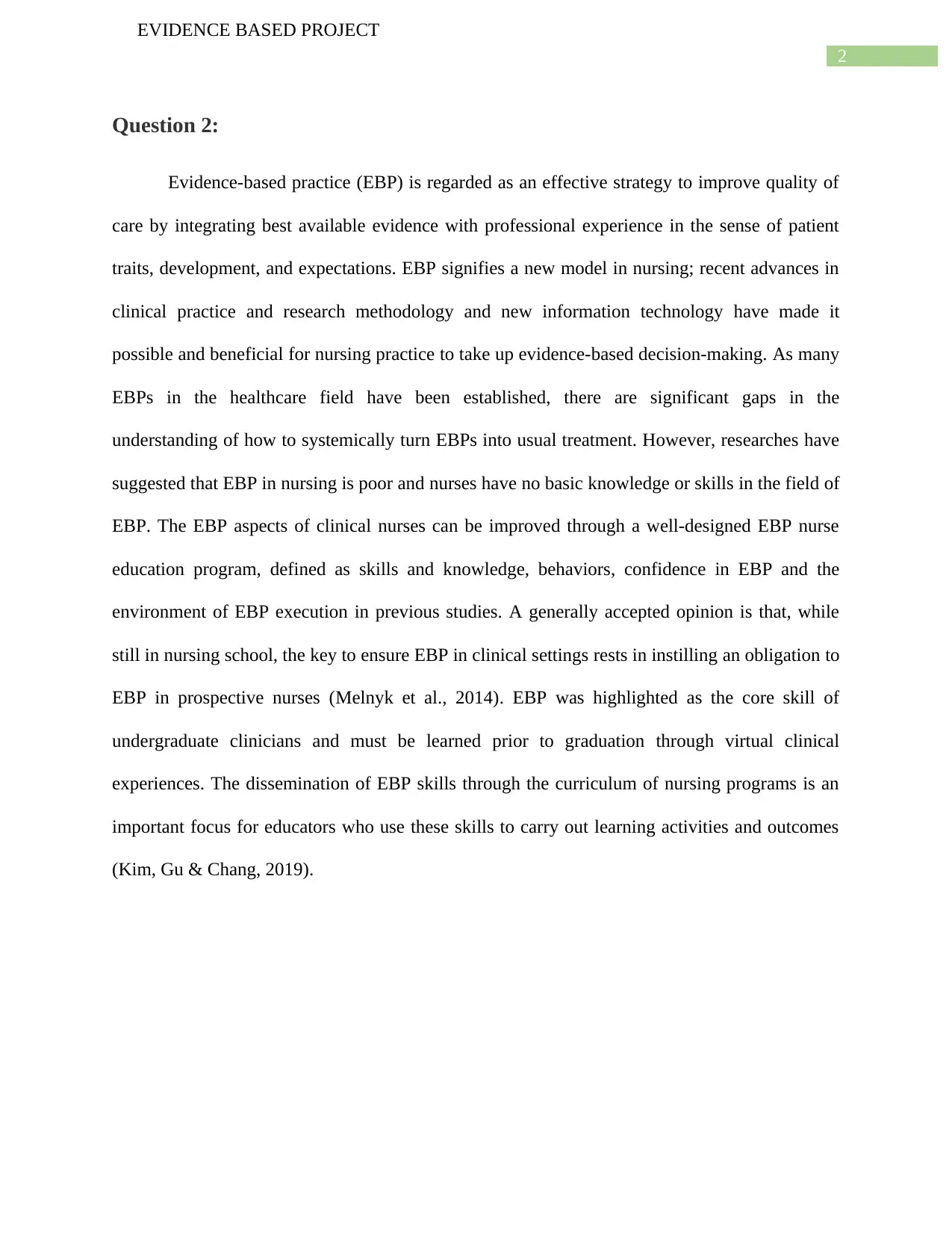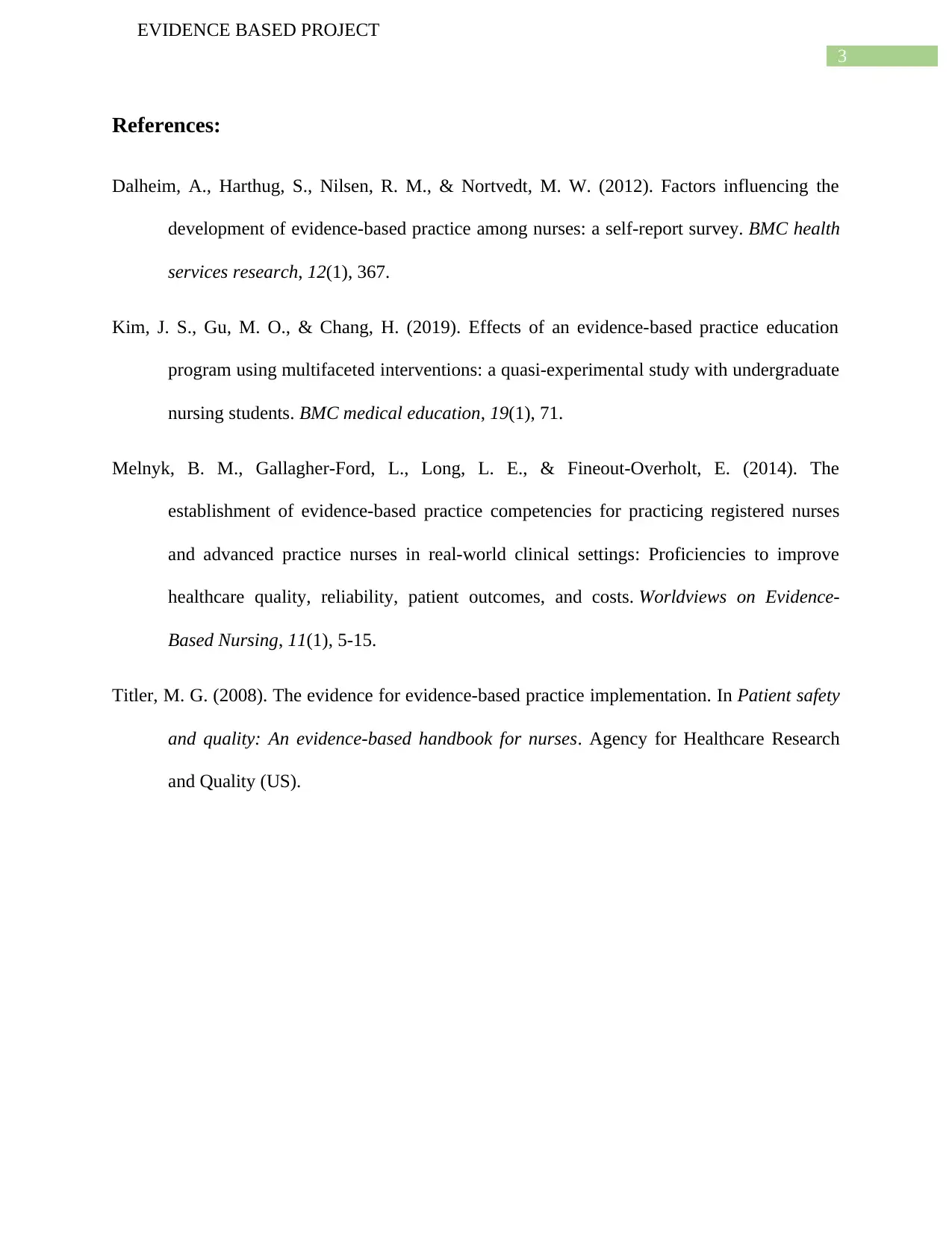Evidence-Based Practice Project Report: Financial, Clinical, Quality
VerifiedAdded on 2022/09/10
|4
|812
|18
Report
AI Summary
This report presents an evidence-based practice project, addressing critical areas in healthcare. The author identifies and discusses financial, clinical, and quality concerns, emphasizing the importance of cost reduction, improved patient outcomes, and the role of healthcare professionals. The project highlights the value of evidence-based practice (EBP) in improving the quality of care by integrating the best available evidence with professional experience, particularly in nursing. The report explores the need for EBP education and training, especially for undergraduate nurses, to ensure the implementation of EBP in clinical settings. The references cited support the importance of EBP in nursing and healthcare to improve patient care and reduce costs.

Running head: EVIDENCE BASED PROJECT
EVIDENCE BASED PROJECT
Name of the Student
Name of the University
Author Note
EVIDENCE BASED PROJECT
Name of the Student
Name of the University
Author Note
Paraphrase This Document
Need a fresh take? Get an instant paraphrase of this document with our AI Paraphraser

1
EVIDENCE BASED PROJECT
Question 1:
Three critical areas which should be addressed include financial clinical and quality
concerns after consulting with my mentor about the development of an evidence based practice
solution. When designing the evidence-based approaches initiative, one financial aspect that
should be taken into account is whether the evidence-based solution will help reduce health care
costs to the target people. Low cost, but very good health care provision is one of the main goals
of 21st century healthcare. The evidence-based treatment initiative is expected to reduce health
care costs by minimizing hospital readmission rates and the medical costs of prescription
procurement. In terms of quality, it is important for the treatment to help promote predicted
health outcomes for patients, including the reduction of the death rate, increased patient quality
of life and reduced readmission from hospitals, among other metrics in particular. To promote
the use of evidence-based solutions in ambulatory and inpatient circumstances, the provision of
healthcare professionals, with the relevant expertise and resources, is a therapeutic factor that
requires attention. In the combination of the expertise needed to successfully incorporate the
EBP approach, its accessible existence and its effect on workloads in an organization, it is
important to take into consideration in the midst of the prevalent lack of healthcare practitioners
in a healthcare system (Titler, 2008).
Evidence-based practice requires professional decision-making based on the evidence
gathered consistently from the research and experience and on the expectations and desires of
patients in a particular situation. The quality in health services was supported by public
authorities and by professional bodies, both international and national entities. The advantage is
that health care services based on evidence will help meet the challenges of enhancing the
protection and the quality of services for patients (Dalheim et al., 2012).
EVIDENCE BASED PROJECT
Question 1:
Three critical areas which should be addressed include financial clinical and quality
concerns after consulting with my mentor about the development of an evidence based practice
solution. When designing the evidence-based approaches initiative, one financial aspect that
should be taken into account is whether the evidence-based solution will help reduce health care
costs to the target people. Low cost, but very good health care provision is one of the main goals
of 21st century healthcare. The evidence-based treatment initiative is expected to reduce health
care costs by minimizing hospital readmission rates and the medical costs of prescription
procurement. In terms of quality, it is important for the treatment to help promote predicted
health outcomes for patients, including the reduction of the death rate, increased patient quality
of life and reduced readmission from hospitals, among other metrics in particular. To promote
the use of evidence-based solutions in ambulatory and inpatient circumstances, the provision of
healthcare professionals, with the relevant expertise and resources, is a therapeutic factor that
requires attention. In the combination of the expertise needed to successfully incorporate the
EBP approach, its accessible existence and its effect on workloads in an organization, it is
important to take into consideration in the midst of the prevalent lack of healthcare practitioners
in a healthcare system (Titler, 2008).
Evidence-based practice requires professional decision-making based on the evidence
gathered consistently from the research and experience and on the expectations and desires of
patients in a particular situation. The quality in health services was supported by public
authorities and by professional bodies, both international and national entities. The advantage is
that health care services based on evidence will help meet the challenges of enhancing the
protection and the quality of services for patients (Dalheim et al., 2012).

2
EVIDENCE BASED PROJECT
Question 2:
Evidence-based practice (EBP) is regarded as an effective strategy to improve quality of
care by integrating best available evidence with professional experience in the sense of patient
traits, development, and expectations. EBP signifies a new model in nursing; recent advances in
clinical practice and research methodology and new information technology have made it
possible and beneficial for nursing practice to take up evidence-based decision-making. As many
EBPs in the healthcare field have been established, there are significant gaps in the
understanding of how to systemically turn EBPs into usual treatment. However, researches have
suggested that EBP in nursing is poor and nurses have no basic knowledge or skills in the field of
EBP. The EBP aspects of clinical nurses can be improved through a well-designed EBP nurse
education program, defined as skills and knowledge, behaviors, confidence in EBP and the
environment of EBP execution in previous studies. A generally accepted opinion is that, while
still in nursing school, the key to ensure EBP in clinical settings rests in instilling an obligation to
EBP in prospective nurses (Melnyk et al., 2014). EBP was highlighted as the core skill of
undergraduate clinicians and must be learned prior to graduation through virtual clinical
experiences. The dissemination of EBP skills through the curriculum of nursing programs is an
important focus for educators who use these skills to carry out learning activities and outcomes
(Kim, Gu & Chang, 2019).
EVIDENCE BASED PROJECT
Question 2:
Evidence-based practice (EBP) is regarded as an effective strategy to improve quality of
care by integrating best available evidence with professional experience in the sense of patient
traits, development, and expectations. EBP signifies a new model in nursing; recent advances in
clinical practice and research methodology and new information technology have made it
possible and beneficial for nursing practice to take up evidence-based decision-making. As many
EBPs in the healthcare field have been established, there are significant gaps in the
understanding of how to systemically turn EBPs into usual treatment. However, researches have
suggested that EBP in nursing is poor and nurses have no basic knowledge or skills in the field of
EBP. The EBP aspects of clinical nurses can be improved through a well-designed EBP nurse
education program, defined as skills and knowledge, behaviors, confidence in EBP and the
environment of EBP execution in previous studies. A generally accepted opinion is that, while
still in nursing school, the key to ensure EBP in clinical settings rests in instilling an obligation to
EBP in prospective nurses (Melnyk et al., 2014). EBP was highlighted as the core skill of
undergraduate clinicians and must be learned prior to graduation through virtual clinical
experiences. The dissemination of EBP skills through the curriculum of nursing programs is an
important focus for educators who use these skills to carry out learning activities and outcomes
(Kim, Gu & Chang, 2019).
⊘ This is a preview!⊘
Do you want full access?
Subscribe today to unlock all pages.

Trusted by 1+ million students worldwide

3
EVIDENCE BASED PROJECT
References:
Dalheim, A., Harthug, S., Nilsen, R. M., & Nortvedt, M. W. (2012). Factors influencing the
development of evidence-based practice among nurses: a self-report survey. BMC health
services research, 12(1), 367.
Kim, J. S., Gu, M. O., & Chang, H. (2019). Effects of an evidence-based practice education
program using multifaceted interventions: a quasi-experimental study with undergraduate
nursing students. BMC medical education, 19(1), 71.
Melnyk, B. M., Gallagher‐Ford, L., Long, L. E., & Fineout‐Overholt, E. (2014). The
establishment of evidence‐based practice competencies for practicing registered nurses
and advanced practice nurses in real‐world clinical settings: Proficiencies to improve
healthcare quality, reliability, patient outcomes, and costs. Worldviews on Evidence‐
Based Nursing, 11(1), 5-15.
Titler, M. G. (2008). The evidence for evidence-based practice implementation. In Patient safety
and quality: An evidence-based handbook for nurses. Agency for Healthcare Research
and Quality (US).
EVIDENCE BASED PROJECT
References:
Dalheim, A., Harthug, S., Nilsen, R. M., & Nortvedt, M. W. (2012). Factors influencing the
development of evidence-based practice among nurses: a self-report survey. BMC health
services research, 12(1), 367.
Kim, J. S., Gu, M. O., & Chang, H. (2019). Effects of an evidence-based practice education
program using multifaceted interventions: a quasi-experimental study with undergraduate
nursing students. BMC medical education, 19(1), 71.
Melnyk, B. M., Gallagher‐Ford, L., Long, L. E., & Fineout‐Overholt, E. (2014). The
establishment of evidence‐based practice competencies for practicing registered nurses
and advanced practice nurses in real‐world clinical settings: Proficiencies to improve
healthcare quality, reliability, patient outcomes, and costs. Worldviews on Evidence‐
Based Nursing, 11(1), 5-15.
Titler, M. G. (2008). The evidence for evidence-based practice implementation. In Patient safety
and quality: An evidence-based handbook for nurses. Agency for Healthcare Research
and Quality (US).
1 out of 4
Related Documents
Your All-in-One AI-Powered Toolkit for Academic Success.
+13062052269
info@desklib.com
Available 24*7 on WhatsApp / Email
![[object Object]](/_next/static/media/star-bottom.7253800d.svg)
Unlock your academic potential
Copyright © 2020–2026 A2Z Services. All Rights Reserved. Developed and managed by ZUCOL.





